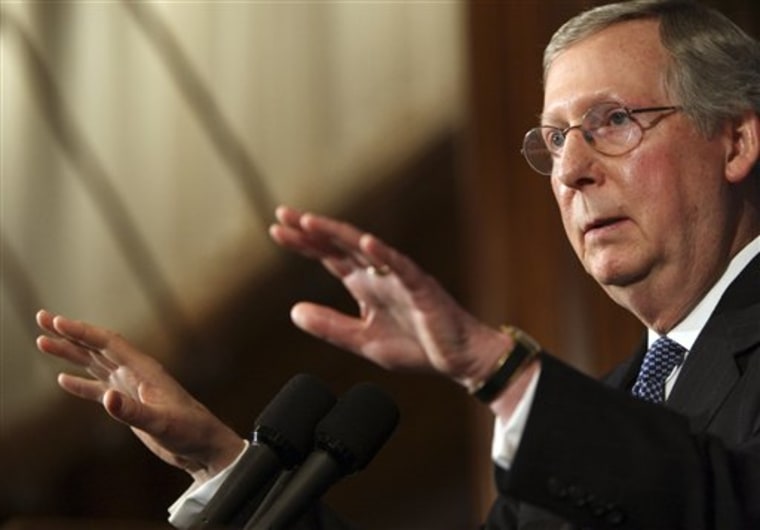After crushing defeats in back-to-back elections, the top Senate Republican warned Thursday that the GOP risks remaining out of power in the White House and Congress unless it better explains its core principles to woo one-time faithful and new loyalists.
"The results of the two recent elections are real, and so are the obstacles we face as a party," Sen. Mitch McConnell, R-Ky., told the Republican National Committee on Thursday. "My concern is that unless we do something to adapt, our status as a minority party may become too pronounced for an easy recovery."
"The situation is challenging, but it's far from irreversible," McConnell added, a dash of optimism in an otherwise stark assessment of where the Republican Party went wrong as he provided a road map for how it can right itself.
He spoke to Republicans gathered in Washington to choose the next national chairman; five candidates are trying to unseat former President George W. Bush's hand-picked RNC chairman, Mike Duncan of Kentucky. The vote is Friday.
Implicit in McConnell's message was the concern that the Republican Party under Bush strayed from its beliefs, resulting in drubbings in two straight elections.
While McConnell praised Bush as a man of principle, he said: "We can all agree, sad as it is, that he wasn't winning any popularity contests. And history shows that unpopular presidents are usually a drag on everybody else who wears their political label."
McConnell called for the GOP to embrace its conservative principles — and resist diluting its message — to bring people back and attract new rank-and-file. Still, he added: "It's clear our message isn't getting out to nearly as many people as it should ... Too often we've let others define us. And the image they've painted isn't very pretty."
He acknowledged GOP fears that certain demographics from certain regions have shunned the party. And, he warned: "In politics, there's a name for a regional party: it's called a minority party."
Just eight years after Republicans controlled the White House and Congress, the GOP finds itself out of power and trying to figure out how to rebound while its foe has grown much stronger. The Democratic Party is empowered by a broadened coalition of voters — including Hispanics and young voters — who swung behind President Barack Obama's call for change.
Meanwhile, Bush left the White House with very low job approval ratings, Republicans saw their ranks in Congress grow even smaller and the party finds itself without a standard-bearer. Perhaps even more damaging to the GOP, the slice of the country that calls itself Republican has shrunk over the past few years as Obama and his Democrats attracted voters of all political stripes.
Among those challenging Duncan for party chairman are: former Maryland Lt. Gov. Michael Steele, former Ohio Secretary of State Ken Blackwell, South Carolina GOP chairman Katon Dawson, Michigan GOP chairman Saul Anuzis and former Tennessee GOP chairman Chip Saltsman. They have spent the past few months arguing that Duncan simply represents a continuation of Bush.
Republicans say it's all but certain no one will get a majority on the first ballot when the 168-member RNC votes. Republicans say Duncan leads in endorsements for a second two-year term, with Steele, Dawson and Anuzis in competitive positions, while Blackwell trails. Saltsman is by far the longest shot, Republicans say.
Still, with at least two rounds of balloting expected, it's possible anyone could end up with a majority.
